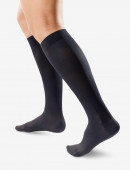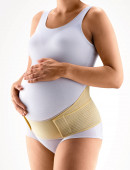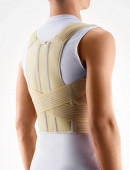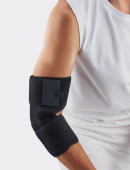Pregnancy, a time that is so beautiful in the life of a woman, is also one of the risk factors for dilated veins or varicose veins, which needs attention to ensure a peaceful and harmonious time when expecting the baby.
Heavy legs? It is the first signal to check the veins
There are cases when the future mother already gets dilated veins during the first pregnancy (commonly, when the first indications have already presented), but most often it happens in the case of the second and every following pregnancy. For this reason, when expecting a baby, timely precautions are important to avoid dilated veins and help in cases when they have formed.
Complaints about heaviness in the legs and oedema around the ankles are the first signals that may suggest the possible development of vein-related problems for the future mother. Upon noticing these symptoms, you should definitely talk to the gynaecologist and, if needed, arrange a visit with a phlebologist, who will evaluate the situation. A visit to the phlebologist is definitely needed if visible venous nodes have been detected during the pregnancy. The sooner the problem is addressed, the slower it will develop, and the expectant mother will have an easier time walking during the period of expectancy. You should also be aware that dilated veins during pregnancy may cause different complications, therefore this problem should not be left unattended.
Why do Pregnant Women Develop Dilated Veins?
The reasons why women have a bigger risk of developing dilated veins during pregnancy is related to gaining extra weight. When the baby is growing, the woman’s small pelvis is gradually pressed, and venous reflux becomes difficult. When the blood cannot circulate in the veins as freely as before, obstructions may arise, and vein dilations may occur. The reason for this is that during pregnancy the level of progesterone elevates, resulting in the relaxation of the plain muscles. Because of this, the walls of the veins become loose and dilate easier.
Special attention should be paid by those women whose female lineage of family members, mothers and grandmothers have also experienced these problems. And also, those who have already developed vein nodes during the first pregnancy.
The Main Aid - Compression Socks
In order not to harm the expected baby or future mother, radical treatment of veins does not take place during pregnancy or the time when the mother breast-feeds the baby. For this reason, precautions should be taken to prevent the problem or diminish it. To alleviate the situation to the maximum, precautions should already be taken at the start of pregnancy. Even if there are no signs that would indicate the possible dilation of veins during pregnancy.
The only possibility to take care of vein health when expecting the baby or breast-feeding it, is wearing compression socks or tights. Here it is important to know that these socks, depending on the stage of the problem, create a different degree of pressure on the walls of the veins; for this reason, to achieve the maximum effect, these socks are chosen by the phlebologist upon evaluating the condition of the client.
Properly chosen compression socks, ensuring an even and continuous vein pressure, help the blood to move upwards in the legs to the upper body; they contain the leg and do not allow the veins to relax, in this way providing better circulation in the legs, which is the key task for not developing varicose veins. Due to this, the future mother’s well-being is eased, notably improving her mood, which is very important when expecting a baby. Today, compression socks and tights are so different and aesthetically pleasing, that they may also be worn both with everyday attire and with party dresses.
It is important to know that if there have been problems with veins during pregnancy, a doctor-phlebologist should be visited during the intermittent period till the next pregnancy in order to decide on the necessary treatment and avoid more severe vein problems during the next pregnancy.
Other advice for precautionary measures regarding veins during pregnancy
There are enough healthy everyday habits worth observing, when expecting a baby for the expectant mother to improve both the way she feels and her mood, and to ensure a harmonious development period for the expected baby. At the same time this advice helps to improve and maintain the health of the veins.
* Movement. During pregnancy, it is important to move every now and then in order to improve the general blood circulation. If work is sedentary, it is important to get up time and again and move, and also take longer walks on a daily basis, which may be walking by foot to work or home.
* Gymnastics. These activities should be balanced with the restrictions during pregnancy, therefore it is best to visit a physiotherapist or go to a special gymnastics group to learn exercises that will be most effective during this period. The same refers to swimming classes and water gymnastics. And, of course, walks in the fresh air!
* Water. Everybody understands the importance of water for providing vital functions, and this need is maintained during pregnancy. It is important to drink enough water, in order for the blood and lymph to be liquid and circulate in the system without interruption, and also to enhance the metabolism and other functions of the body.
* Cold shower. To help venous circulation in the legs, and also to reduce fatigue at the end of the day, a cold shower is beneficial, directing the water stream from bottom to top, the way the blood circulates in the veins.
* NO to tight clothing. This is one of the factors enhancing varicose veins, especially, if tight clothing, pressing the waist and hips, is worn every day and regularly. During pregnancy, it can elevate the risk of varicose veins even more, as it limits free blood circulation.
* Yes to comfortable footwear. With an increase in weight during pregnancy, the legs are exposed to higher loads, therefore it is important to choose comfortable footwear, in which it is possible to easily move about on a daily basis.
* Avoiding Constipation. It enhances the formation of body waste, which damages the connective tissue. Bowel movement disorders also provoke higher pressure in the veins. For better bowel movement, a sufficient intake of fibre is important.
* Legs above head level. When relaxing in a horizontal position, venous reflux is better, if the legs are placed on a pillow or another elevation, slightly above head level. This condition should be observed when resting both during daytime and at night.
* Monitoring weight. Pregnancy is unavoidably connected with gaining extra weight, however it is important to observe a healthy diet and a balanced physical load in order not to gain excess weight that obstructs venous circulation.
Photo by Derick McKinney on Unsplash





